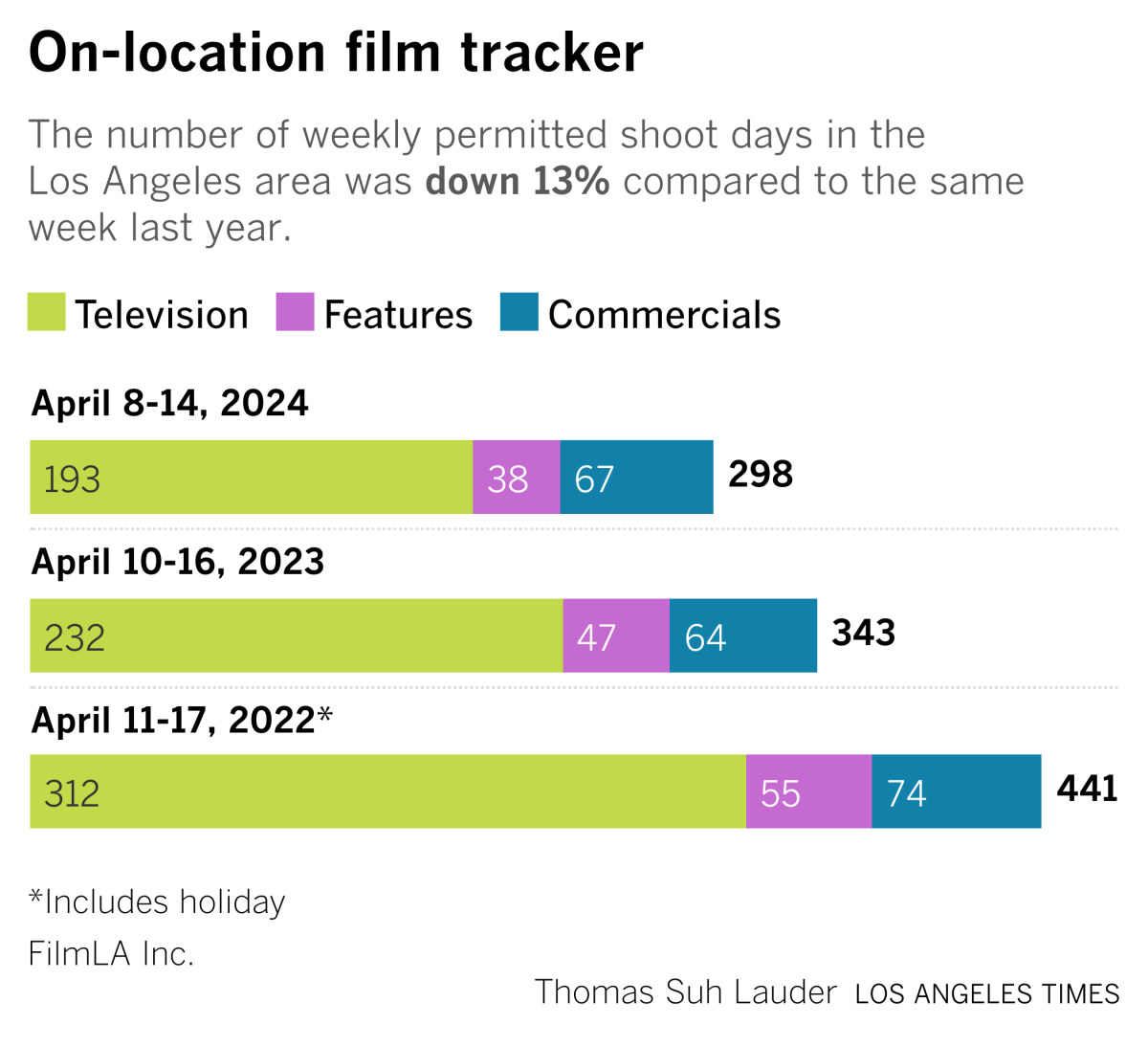After ‘Civil War’ and mainstream success, can indie darling A24 keep its cool?

Earlier this month, indie studio A24 released a provocative promotional image for its latest film, “Civil War” — depicting a map of a dystopian America divided into surprising alliances between the states.
With no explanation for the fictional breakdown of the republic, the image showed California and Texas united as the so-called Western Forces, whereas much of the southeast had apparently formed the Florida Alliance, leaving the rest of the country split between the New People’s Army in the northwest and the Loyalist States elsewhere.
If the idea was to ignite discourse, it succeeded — an example of the savvy marketing strategies employed by New York-based A24, known for its history of successfully selling challenging material to theatrical and television audiences.
“Civil War,” the latest effort from “Annihilation” and “Ex Machina” director Alex Garland, opened with an estimated $25.7 million in ticket sales from the U.S. and Canada, which exceeded industry expectations. It’s the biggest domestic opening weekend for an A24 movie since the company’s founding in 2012.
The A24 mystique is rare among film companies. With movies including “Hereditary,” “Lady Bird,” “Uncut Gems” and best-picture Oscar winners “Moonlight” and “Everything Everywhere All at Once,” the firm has developed brand recognition and a loyal following. For some moviegoers, seeing A24’s banner appear before the opening credits is a significant selling point.
As evidenced by “Civil War,” the company’s ambitions are only growing. The movie carries a reported production budget of $50 million, and the official trailer, with its harrowing shots of flying helicopters and urban warfare, could easily have been mistaken for a Gerard Butler action thriller. Fittingly, it played on Imax screens, an unusual feat for an indie film.
(Audiences, it’s worth noting, were split on “Civil War,” giving it a B-minus CinemaScore, so its domestic grosses may top out at around $70 million, according to rival distributors.)
Helping to fuel A24’s efforts to become a bigger Hollywood player is a $225-million funding round from a consortium of investors in 2022, led by Stripes, a firm founded by New York investor Ken Fox. The deal, which came at a frothy time for investment in independent production companies, valued A24 at an eye-popping $2.5 billion.
The question facing any hip entertainment company as it transitions into a more mainstream phase is the same one that successful indie rock bands have grappled with for decades: Can they maintain the essence that made them cool in the first place while also achieving greater commercial clout?
In a Bloomberg Businessweek article published in February, the company’s TV head talked about the idea of A24 having its own take on reality TV shows like “The Hills” or “Laguna Beach.”
Well, so far, so good.
A24’s efforts in television seem to have stayed true to its edgy reputation, securing a major hit with HBO’s “Euphoria,” followed by Emmy-winner “Beef” and “The Curse,” which ended with one of the strangest finales in recent memory. (“The Idol” flopped with critics and viewers, becoming a hate-watch for some.)
In film, the taste quotient remains high, with awards season contenders including “Past Lives” and “The Zone of Interest” mixed in with the artsy horror flicks such as “Talk to Me” and Ti West’s ongoing Mia Goth-starring “X” trilogy (“MaXXXine” is set for release in July).
An important question mark looming over A24’s rise is the state of the market for theatrical movies more broadly. Even at CinemaCon, the annual trade show (doubling as propaganda event) for the theater chains and studios, there were acknowledgments of the challenges in the industry as it tries to recover (still) from the COVID-19 pandemic.
Movies are expected to generate $8 billion to $8.5 billion in sales in the U.S. and Canada this year, which is way down from pre-virus years. In 2023, movies grossed $9 billion domestically. Ouch.
As my colleague Christi Carras reported all week from the Las Vegas convention at Caesars Palace, there has been constant chatter about theater operators teetering on the edge of insolvency. The 2024 slate is thin, thanks to last year’s writers’ and actors’ strikes. But that’s not the only cause for concern. Studios are cutting budgets, which means fewer movies.
A24 didn’t present at CinemaCon. Neither did its closest rival, Neon, though that company did screen an upcoming comedy, “Babes.” Sony Pictures’ film boss Tom Rothman did not take the Colosseum stage this year, depriving the festivities of much pro-theater chest-beating.
(Sony-owned anime shop Crunchyroll did present; “Sound of Freedom” firm Angel Studios held a breakfast talk about its slate.) Next year is expected to be stronger as studios release more movies, but by how much, no one really knows.
Adult-skewing indie movies are an especially challenging business after the pandemic. The bar has risen in terms of what audiences will consider worthy of trekking to their local multiplexes to see, especially if they have to pay a babysitter.
But A24 has found a lane, particularly with the types of moviegoers who enjoy sniping about film in group chats and on social media platforms, including cinephile refuge Letterboxd. But that’s not all. Part of A24’s success is due to an ability to understand its own fan base, which cares about “Dune: Part Two” as much as it flocks to Sundance midnight-screening catnip. No need to take sides there.
You’re reading the Wide Shot
Ryan Faughnder delivers the latest news, analysis and insights on everything from streaming wars to production — and what it all means for the future.
You may occasionally receive promotional content from the Los Angeles Times.
Stuff we wrote
Paramount, Shari Redstone face investor angst over possible Skydance deal. Shares of Paramount Global took a beating after news that several directors are leaving the company’s board. Some investors have taken public swipes at the board for negotiating exclusively with Skydance.
How O.J. Simpson’s murder trial changed the TV news business. The actor and former football star’s trial, where he was acquitted, was filled with stunning moments. It rocked the media landscape and became the first true-crime mega hit.
Google says it will reduce some user access to California news sites. The internet search giant said it will remove links to California news sites for some users because of concerns about a state bill that may require Google to pay publishers.
Why brands are working with digital avatars. Hatsune Miku has already sold out venues for her concerts and she’ll go to her biggest stage yet at Coachella. She looks like a teenage girl, but she’s not human.
Hollywood’s stunt-driving industry is dominated by men. These women are fighting for change. Olivia Summers and Dee Bryant are building a team of all-women stunt drivers to make the stunt-driving industry more inclusive.
Obits for two big names in television news. Robert MacNeil, the stately journalist who brought news to PBS, is dead at 93. MacNeil was the founding anchor of “PBS NewsHour.” Also, Richard Leibner, pioneering agent of TV news stars, died at 85. Leibner negotiated for many of the biggest (and richest) names in network news, including Diane Sawyer and Mike Wallace.
Number of the week

Hannah Gutierrez, the armorer on the set of the Alec Baldwin movie “Rust,” was sentenced Monday to 18 months in New Mexico prison — the maximum penalty — after her involuntary manslaughter conviction for her role in the death of cinematographer Halyna Hutchins. Baldwin’s criminal trial is set to begin in July in Santa Fe. Read Meg James’ story for more details on Gutierrez’s hearing.
Film shoots
Latest film shoot data for Los Angeles, courtesy of FilmLA.

Best of the web (and other bookmarks)
— How a case against Fox News tore apart a media-fighting law firm. (New York Times)
— If you thought Disney adults were wild ... Adult fans of Lego, known as AFOLs, are now big business for the world’s largest toy maker. (Wall Street Journal)
— Netflix’s “3 Body Problem” showcases one of China’s most successful works of culture. Instead of demonstrating pride, local social media is condemning it. (NYT)
— Coachella ticket sales were slower than in recent years. (Read all about it here.) Other festivals have been struggling too. Fun-flation! It was fun while it lasted.
Well, it sounds like the festival was a good time, nonetheless, if you believe my colleague Vanessa Franko (and I do).
Finally ...
This newsletter and my taxes were completed to the sounds of the latest Vampire Weekend album.
The Wide Shot is going to Sundance!
We’re sending daily dispatches from Park City throughout the festival’s first weekend. Sign up here for all things Sundance, plus a regular diet of news, analysis and insights on the business of Hollywood, from streaming wars to production.
You may occasionally receive promotional content from the Los Angeles Times.




